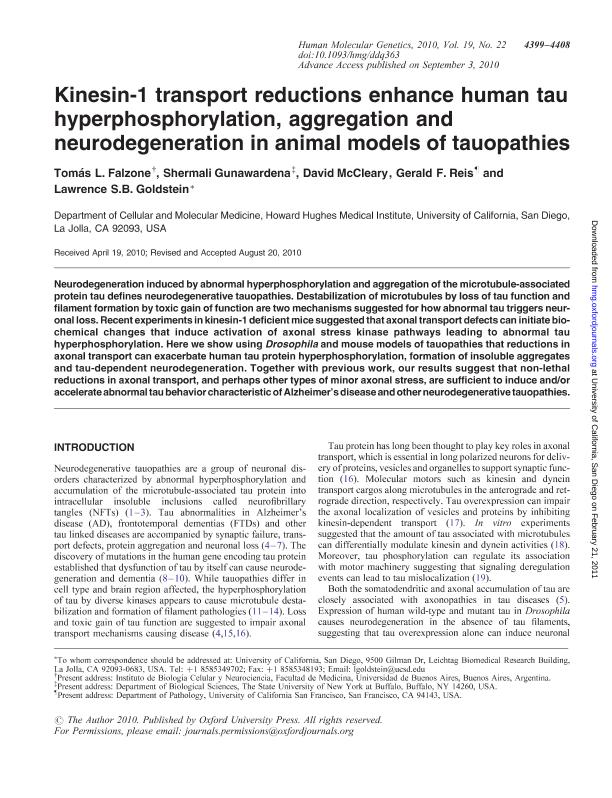Artículo
Kinesin-1 transport reductions enhance human tau hyperphosphorylation, aggregation and neurodegeneration in animal models of tauopathies
Falzone, Tomas Luis ; Gunawardena, Shermali; McCleary, David; Reis, Gerald F.; Goldstein, Lawrence S. B.
; Gunawardena, Shermali; McCleary, David; Reis, Gerald F.; Goldstein, Lawrence S. B.
 ; Gunawardena, Shermali; McCleary, David; Reis, Gerald F.; Goldstein, Lawrence S. B.
; Gunawardena, Shermali; McCleary, David; Reis, Gerald F.; Goldstein, Lawrence S. B.
Fecha de publicación:
11/2010
Editorial:
Oxford University Press
Revista:
Human Molecular Genetics
ISSN:
0964-6906
Idioma:
Inglés
Tipo de recurso:
Artículo publicado
Clasificación temática:
Resumen
Neurodegeneration induced by abnormal hyperphosphorylation and aggregation of the microtubule-associated protein tau defines neurodegenerative tauopathies. Destabilization of microtubules by loss of tau function and filament formation by toxic gain of function are two mechanisms suggested for how abnormal tau triggers neuronal loss. Recent experiments in kinesin-1 deficient mice suggested that axonal transport defects can initiate biochemical changes that induce activation of axonal stress kinase pathways leading to abnormal tau hyperphosphorylation. Here we show using Drosophila and mouse models of tauopathies that reductions in axonal transport can exacerbate human tau protein hyperphosphorylation, formation of insoluble aggregates and tau-dependent neurodegeneration. Together with previous work, our results suggest that non-lethal reductions in axonal transport, and perhaps other types of minor axonal stress, are sufficient to induce and/or accelerate abnormal tau behavior characteristic of Alzheimer's disease and other neurodegenerative tauopathies.
Palabras clave:
Transporte Axonal
,
Tauopatias Neurodegenerativas
,
Tau
,
Jnk
Archivos asociados
Licencia
Identificadores
Colecciones
Articulos(IBCN)
Articulos de INST.DE BIOLO.CEL.Y NEURCS."PROF.E.DE ROBERTIS"
Articulos de INST.DE BIOLO.CEL.Y NEURCS."PROF.E.DE ROBERTIS"
Citación
Falzone, Tomas Luis; Gunawardena, Shermali; McCleary, David; Reis, Gerald F.; Goldstein, Lawrence S. B.; Kinesin-1 transport reductions enhance human tau hyperphosphorylation, aggregation and neurodegeneration in animal models of tauopathies; Oxford University Press; Human Molecular Genetics; 19; 22; 11-2010; 4399-4408
Compartir
Altmétricas



